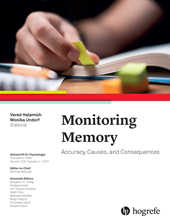Why Does Excellent Monitoring Accuracy Not Always Produce Gains in Memory Performance?
Abstract
Abstract. Does excellent monitoring of learning support improvements in subsequent relearning? Although some studies answer this question affirmatively, others have suggested that excellent monitoring may not matter. Accordingly, we address the question, when will highly accurate monitoring judgments benefit restudy? According to the contingent-efficacy hypothesis, excellent monitoring accuracy will not benefit learning (a) when restudy itself produces only small learning gains for items that were restudied, (b) when few (or most) of the items have been learned prior to restudy, and (c) when learners use their accurate judgments inappropriately for making restudy selections. Under these circumstances, the contingent-efficacy hypothesis predicts that restudy will be suboptimal, whereas under more ideal conditions (e.g., learning gains are high during restudy), excellent monitoring is expected to enhance restudy efficacy. By confirming these predictions across three experiments, the current research reconciles the prior discrepancies and reveals when excellent monitoring will matter for effectively guiding restudy.
References
(1992). Memory monitoring: How useful is self-knowledge about memory? European Journal of Cognitive Psychology, 4, 195–218. https://doi.org/10.1080/09541449208406182
(2011).
Self-regulated learning and the allocation of study time . In B. RossEd., Psychology of learning and motivation (Vol. 54, pp. 103–140). Elsevier.(2014). Feeling of knowing and restudy choices. Psychonomic Bulletin & Review, 21, 1617–1622. https://doi.org/10.3758/s13423-014-0619-0
(2002). Monitoring associative learning: What determines the accuracy of metacognitive judgments. Psychology & Aging, 17, 209–225.
(2012). Does delaying judgments of learning really improve the efficacy of study decisions? Not so much. Journal of Experimental Psychology: Learning, Memory & Cognition, 38(4), 923–954. https://doi.org/10.1037/a0026936
(1996). Monitoring and control processes in the strategic regulation of memory accuracy. Psychological Review, 103(3), 490–517. https://doi.org/10.1037/0033-295x.103.3.490
(2014). Is focusing on unknown pairs while studying a beneficial long-term strategy? Journal of Cognitive Psychology, 26, 928–942. https://doi.org/10.1080/20445911.2014.967771
(2006). Study efficacy and the region of proximal learning framework. Journal of Experimental Psychology: Learning, Memory, Cognition, 32, 609–622. https://doi.org/10.1037/0278-7393.32.3.609
(2012). Age-related effects of study time allocation on memory performance in a verbal and a spatial task. Educational Gerontology, 38, 604–615. https://doi.org/10.1080/03601277.2011.595327
(2009). Metacognitive judgments and control of study. Current Directions in Psychological Science, 18, 159–163. https://doi.org/10.1111/j.1467-8721.2009.01628.x
(2008). Evidence that judgments of learning are causally related to study choice. Psychonomic Bulletin & Review, 15, 174–179. https://doi.org/10.3758/pbr.15.1.174
(2013). Metacognition and control of study choice in children. Metacognition & Learning, 8, 19–46. https://doi.org/10.1007/s11409-013-9094-7
(2005). A region of proximal learning model of study time allocation. Journal of Memory and Language, 52(4), 463–477. https://doi.org/10.1016/J.JML.2004.12.001
(2020). Do students make effective decisions when regulating their learning of categories? Translational Issues in Psychological Science, 5, 43–52.
(2017). Do people use category-learning judgments to regulate learning of natural categories? Memory & Cognition, 45, 1253–1269. https://doi.org/10.3758/s13421-017-0729-9
(1994). Utilization of metacognitive judgments in the allocation of study during multitrial learning. Psychological Science, 5, 207–213. https://doi.org/10.1111/j.1467-9280.1994.tb00502.x
(1990).
Metamemory: A theoretical framework and new findings . In G. H. BowerEd., Psychology of learning and motivation (Vol. 26, pp. 125–173). Academic Press.(2004). A revised methodology for research on metamemory: Pre-judgment Recall and Monitoring (PRAM). Psychological Methods, 9(1), 54–69. https://doi.org/10.1037/1082-989X.9.1.53
(2011). The influence of delaying judgments of learning on metacognitive accuracy: A meta-analytic review. Psychological Bulletin, 137, 131–148. https://doi.org/10.1037/a0021705
(2010). Metacognitive control and the spacing effect. Journal of Experimental Psychology: Learning, Memory, and Cognition, 36(1), 255–262. https://doi.org/10.1037/a0017892
(2003). Accuracy of metacognitive monitoring affects learning of text. Journal of Educational Psychology, 95(1), 66–73. https://doi.org/10.1037/0022-0663.95.1.66
(2012). Consequences of restudy choices in younger and older learners. Psychonomic Bulletin & Review, 19(4), 743–749. https://doi.org/10.3758/s13423-012-0266-2
(1998).
Studying as self-regulated learning . In D. J. HackerJ. DunloskyA. C. GraesserEds., Metacognition in educational theory and practice (pp. 277–304). Erlbaum.



